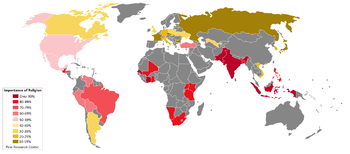| สถิติเป็นรายประเทศทั่วโลก
|
| ประเทศ
|
ร้อยละของผู้ที่กล่าวว่าตนไม่มีศาสนา
|
แหล่งข้อมูล
|
| เอสโตเนีย
|
75.7%
|
Dentsu Communication Institute Inc, Japan Research Center (2006) [3]
|
| อาเซอร์ไบจาน
|
74%
|
Gallup WorldView (2008)[4][5]
|
| แอลเบเนีย
|
60%-75%
|
US Department of State - International Religious Freedom Report 2007[6]
"Instantanés d’Albaníe, un autre regard sur les Balkans", 2005[7]
Various publications[8]
|
| สาธารณรัฐประชาชนจีน
|
59-71%
|
Various publications[9]
|
| สวีเดน
|
46%-85%
|
Zuckerman, Phil. "Atheism: Contemporary Rates and Patterns", chapter in The Cambridge Companion to Atheism, ed. by Michael Martin, Cambridge University Press: Cambridge, UK (2005)
|
| เยอรมนี
|
59%
|
Worldwide Independent Network/Gallup International Association (2015) [10]
|
| เช็กเกีย
|
55%
|
Various publications[11]
|
| ญี่ปุ่น
|
51.8%
|
Dentsu Communication Institute Inc, Japan Research Center (2006) [3]
|
| รัสเซีย
|
48.1%
|
Dentsu Communication Institute Inc, Japan Research Center (2006) [3]
|
| เบลารุส
|
47.8%
|
Dentsu Communication Institute Inc, Japan Research Center (2006) [3]
|
| เวียดนาม
|
46.1%
|
Dentsu Communication Institute Inc, Japan Research Center (2006) [3]
|
| เนเธอร์แลนด์
|
44.0%
|
Social and Cultural Planning Office[12]
|
| ฟินแลนด์
|
28%-60%
|
Zuckerman, Phil. "Atheism: Contemporary Rates and Patterns", chapter in The Cambridge Companion to Atheism, ed. by Michael Martin, Cambridge University Press: Cambridge, UK (2005)
|
| ฮังการี
|
42.6%
|
Dentsu Communication Institute Inc, Japan Research Center (2006) [3]
|
| ยูเครน
|
42.4%
|
Dentsu Communication Institute Inc, Japan Research Center (2006) [3]
|
| อิสราเอล
|
41.0%
|
Zuckerman, Phil. "Atheism: Contemporary Rates and Patterns", chapter in The Cambridge Companion to Atheism, ed. by Michael Martin, Cambridge University Press: Cambridge, UK (2005) [13]
|
| ลัตเวีย
|
40.6%
|
Dentsu Communication Institute Inc, Japan Research Center (2006) [3]
|
| เกาหลีใต้
|
36.4%
|
Dentsu Communication Institute Inc, Japan Research Center (2006) [3]
|
| เบลเยี่ยม
|
35.4%
|
Dentsu Communication Institute Inc, Japan Research Center (2006) [3]
|
| นิวซีแลนด์
|
34.7% (of the 87.3% who answered an optional question)
|
Statistics New Zealand (2006 census) [14]
|
| ชิลี
|
33.8%
|
Dentsu Communication Institute Inc, Japan Research Center (2006) [3]
|
| ลักเซมเบิร์ก
|
29.9%
|
Dentsu Communication Institute Inc, Japan Research Center (2006) [3]
|
| สโลวีเนีย
|
29.9%
|
Dentsu Communication Institute Inc, Japan Research Center (2006) [3]
|
| ฝรั่งเศส
|
27.2% (23.9% of women, 30.6% of men)
|
INSEE (2004 survey) [15]
|
| เวเนซุเอลา
|
27.0%
|
Dentsu Communication Institute Inc, Japan Research Center (2006) [3]
|
| สโลวะเกีย
|
23.1%
|
Dentsu Communication Institute Inc, Japan Research Center (2006) [3]
|
| เม็กซิโก
|
20.5%
|
Dentsu Communication Institute Inc, Japan Research Center (2006) [3]
|
| ลิทัวเนีย
|
19.4%
|
Dentsu Communication Institute Inc, Japan Research Center (2006) [3]
|
| เดนมาร์ก
|
19%
|
Eurobarometer (2005) [16]
|
| ออสเตรเลีย
|
18.7% (of the 88.8% who answered an optional question). 29.9% including no answer/inadequately described
|
Australian Bureau of Statistics (2006 census) [17]
|
| อิตาลี
|
17.8%
|
Dentsu Communication Institute Inc, Japan Research Center (2006) [3]
|
| สเปน
|
17%
|
Centre of Sociological Investigations (2005) [18]
|
| แคนาดา
|
16.2%
|
Canada 2001 Census[19]
|
| อาร์เจนตินา
|
16.0%
|
Gallup-Argentina poll, April 2001[20]
|
| สหราชอาณาจักร
|
15.5% indicated no religion. (23.2% including no answer)
|
United Kingdom 2001 Census.
|
| แอฟริกาใต้
|
15.1%
|
Statistics South Africa Census 2001[21]
|
| สหรัฐ
|
15.0% (of the 94.6% who answered an optional question, out of a sample of 50,281 households in the 48 contiguous states; 21% of the United States Military, 32% if including unknown/refused/no answer)
|
American Religious Identification Survey (2001), as reported by US Census Bureau; [22] America's Military Population (Population Reference Bureau) [23]
|
| โครเอเชีย
|
13.2%
|
Dentsu Communication Institute Inc, Japan Research Center (2006) [3]
|
| ออสเตรีย
|
12.2%
|
Dentsu Communication Institute Inc, Japan Research Center (2006) [3]
|
| โปรตุเกส
|
11.4%
|
Dentsu Communication Institute Inc, Japan Research Center (2006) [3]
|
| เปอร์โตริโก
|
11.1%
|
Dentsu Communication Institute Inc, Japan Research Center (2006) [3]
|
| บัลแกเรีย
|
11.1%
|
Dentsu Communication Institute Inc, Japan Research Center (2006) [3]
|
| ไอซ์แลนด์
|
11%
|
Eurobarometer Poll (2005) [16]
|
| ฟิลิปปินส์
|
10.9%
|
Dentsu Communication Institute Inc, Japan Research Center (2006) [3]
|
| บราซิล
|
7.4%
|
National Demografic Census in 2000, conducted by the IBGE. [24]
|
| อินเดีย
|
6.6%
|
Dentsu Communication Institute Inc, Japan Research Center (2006) [3]
|
| โปแลนด์
|
6%
|
Public Opinion Research Centre (2007) [25]
|
| เซอร์เบียและมอนเตเนโกร
|
5.8%
|
Dentsu Communication Institute Inc, Japan Research Center (2006) [3]
|
| ไอร์แลนด์
|
4.5%
|
Central Statistics Office Ireland Census 2006[26]
|
| เปรู
|
4.7%
|
Dentsu Communication Institute Inc, Japan Research Center (2006) [3]
|
| กรีซ
|
4.0%
|
Dentsu Communication Institute Inc, Japan Research Center (2006) [3]
|
| ตุรกี
|
2.5%
|
Dentsu Communication Institute Inc, Japan Research Center (2006) [3]
|
| โรมาเนีย
|
2.4%
|
Dentsu Communication Institute Inc, Japan Research Center (2006) [3]
|
| แทนซาเนีย
|
1.7%
|
Dentsu Communication Institute Inc, Japan Research Center (2006) [3]
|
| มอลตา
|
1.3%
|
Dentsu Communication Institute Inc, Japan Research Center (2006) [3]
|
| อิหร่าน
|
1.1% (Atheism and Agnosticism are illegal[27])
|
Dentsu Communication Institute Inc, Japan Research Center (2006) [3]
|
| ยูกันดา
|
1.1%
|
Dentsu Communication Institute Inc, Japan Research Center (2006) [3]
|
| ไนจีเรีย
|
0.7%
|
Dentsu Communication Institute Inc, Japan Research Center (2006) [3]
|
| ไทย
|
0.2%
|
จากสำมะโนประชากรและเคหะ พ.ศ. 2543 โดยสำนักงานสถิติแห่งชาติ มีประชากรไทยที่ระบุว่าไม่มีศาสนา 0.2% และไม่ทราบหรือไม่ตอบ 0.3%[28]
|
| บังกลาเทศ
|
0.1%
|
Dentsu Communication Institute Inc, Japan Research Center (2006) [3]
|

